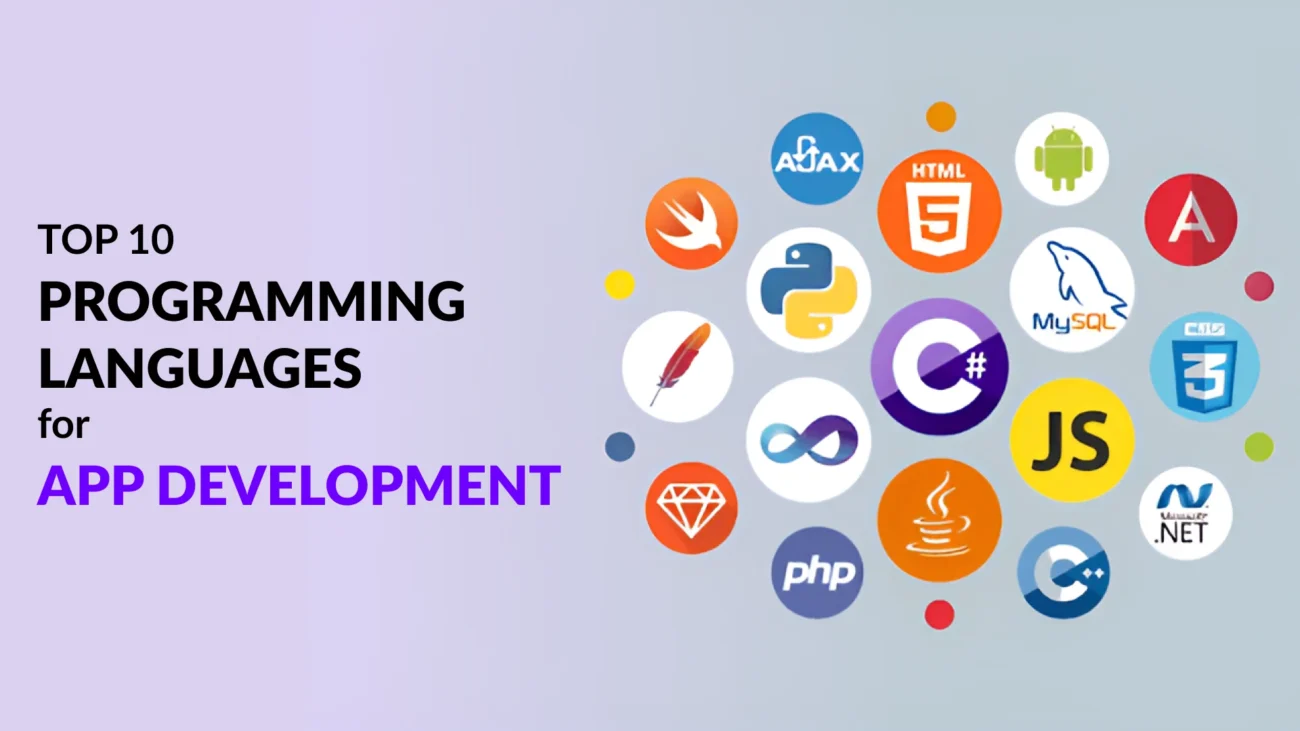App development continues to evolve in 2025, making the choice of programming languages more important than ever. The right language can impact performance, scalability, and speed to market. Whether you’re creating a mobile game, a business tool, or the next big social platform, selecting from the best programming languages ensures your app has a solid foundation.
In this blog, we break down the top 10 programming languages for app development and how they can help your project succeed.
1. JavaScript / TypeScript: The Web App Powerhouses
JavaScript remains one of the most essential programming languages for web-based app development. With the rise of frameworks like React Native and Node.js, developers can build high-performing mobile and desktop applications using JavaScript.
TypeScript, a superset of JavaScript, adds strong typing and advanced features that help reduce bugs and improve developer productivity.
Why Use JavaScript/TypeScript:
- Massive community support
- Ideal for cross-platform development
- Compatible with numerous libraries and frameworks
Use Case: Building scalable single-page applications (SPAs) and cross-platform mobile apps.
2. Dart: The Language Behind Flutter
Dart is the core language for Google’s Flutter SDK, making it one of the fastest-growing programming languages for cross-platform mobile app development.
Why Use Dart:
- Hot reload feature accelerates development
- Smooth performance across iOS and Android
- Strong community backing from Google
Use Case: Creating visually rich, high-performance mobile apps with a single codebase.
3. Swift: Best for iOS App Development
Developed by Apple, Swift is a modern, powerful, and intuitive programming language designed specifically for iOS, macOS, watchOS, and tvOS development.
Why Use Swift:
- Optimized for Apple hardware
- Faster and safer than Objective-C
- Easy to learn for beginners
Use Case: Native app development for iPhones and iPads with high performance and security.
4. Kotlin: The Go-To Language for Android
Kotlin has become the official programming language for Android development, replacing Java in many use cases due to its conciseness and safety features.
Why Use Kotlin:
- Fully interoperable with Java
- Reduces boilerplate code
- Supported directly by Google
Use Case: Developing Android apps with less code and fewer bugs.
5. Java: The Time-Tested Classic
Java remains a dominant force among programming languages thanks to its reliability and platform independence. Despite newer options, Java continues to power many Android apps and enterprise applications.
Why Use Java:
- Extensive libraries and tools
- Object-oriented programming model
- Large developer community
Use Case: Enterprise-grade Android apps and large-scale backend systems.
6. Objective-C: Legacy Support for iOS
Although it has largely been replaced by Swift, Objective-C is still used in many existing iOS apps. Understanding this programming language is vital for maintaining legacy Apple software.
Why Use Objective-C:
- Long-standing Apple language
- Compatibility with older iOS APIs
- Supports dynamic runtime
Use Case: Maintaining and updating older iOS applications.
7. C#: Microsoft’s Language for Cross-Platform Apps
C# (C-Sharp) is a robust object-oriented programming language developed by Microsoft. It powers the Xamarin framework for mobile development and is widely used in Unity for game development.
Why Use C#:
- Strong support from Microsoft
- Versatile for mobile, desktop, and game development
- Rich feature set and strong typing
Use Case: Cross-platform apps using Xamarin and interactive game apps via Unity.
8. C++: The High-Performance Language
C++ remains one of the most powerful programming languages for performance-intensive applications. It is used in developing game engines, real-time systems, and apps requiring extensive processing power.
Why Use C++:
- High execution speed
- Access to low-level memory management
- Wide range of libraries and tools
Use Case: Game development, AR/VR applications, and high-performance software.
9. Python: Ideal for Rapid Prototyping
Python is known for its simplicity and readability, making it a popular programming language for startups and rapid app development. While not traditionally used for mobile apps, frameworks like Kivy and BeeWare are expanding its capabilities.
Why Use Python:
- Easy to learn and use
- Extensive libraries and tools
- Ideal for data-driven applications
Use Case: Backend development, AI-powered apps, and fast prototyping.
10. Rust: Safe and Fast for Performance-Critical Apps
Rust is a modern programming language designed for safety and performance. It avoids common bugs such as null pointer dereferencing and provides memory safety without a garbage collector.
Why Use Rust:
- Memory safety guarantees
- High performance comparable to C++
- Growing community and ecosystem
Use Case: Systems programming, embedded apps, and security-critical mobile applications.
Conclusion
Choosing the right programming languages for app development depends on your project’s needs, target platform, and development timeline. For cross-platform development, JavaScript/TypeScript and Dart are strong choices. If you’re focused on native performance, Swift and Kotlin are unmatched for iOS and Android respectively.
For enterprise-grade apps, Java and C# offer scalability and reliability, while C++ and Rust provide the performance and control needed for cutting-edge technologies.
Whether you’re a solo developer or a business looking to launch an app, keeping up with the latest programming languages ensures you stay ahead of your competition. You can also explore the latest Tips for Business or keep an eye on emerging Small Business Trends to align your app strategy with market needs.


